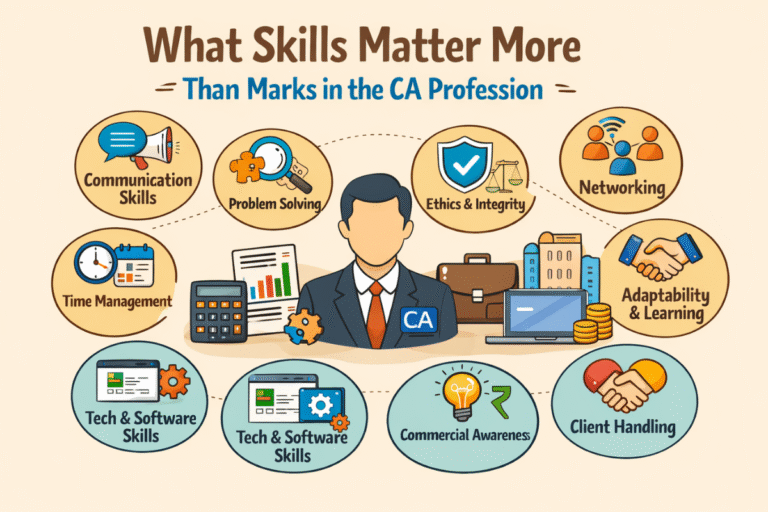The journey to becoming a Chartered Accountant (CA) in India is rigorous and demands a balanced mix of theoretical knowledge and practical experience. One of the most pivotal phases in this journey is the articleship period. Traditionally, CA students complete their articleship under practising Chartered Accountants in CA firms, focusing on audit, taxation, and other compliance services. However, there exists another pathway—industrial training—which offers students a chance to gain hands-on exposure within the corporate sector.
Industrial training for CA students is becoming increasingly popular as it allows trainees to understand the functioning of large businesses, experience corporate culture, and apply their academic learnings in a practical setting. Like every opportunity, industrial training comes with its own set of advantages and disadvantages. This article aims to explain both sides, helping you make an informed decision about whether industrial training is the right step for your CA journey.
What is Industrial Training for CA Students?
Industrial training is a unique provision under the CA curriculum where a student, after completing a minimum of 18 months of articleship, can opt to complete the remaining period (up to 12 months) in an industrial or corporate organisation rather than a traditional CA firm.
The Institute of Chartered Accountants of India (ICAI) has laid down specific rules and guidelines for industrial training. This training is generally undertaken in sectors such as banking, finance, manufacturing, consulting, and information technology, among others. Organisations offering industrial training must be approved by ICAI, and students must seek a No Objection Certificate (NOC) from their existing principal.
Advantages of Industrial Training
Exposure to Corporate Culture
One of the biggest benefits of industrial training is the opportunity to understand and adapt to corporate culture. Working within a large organisation allows CA students to:
- Witness how different departments operate and collaborate.
- Observe real-time decision-making processes at various management levels.
- Learn about corporate governance, compliance, and business strategies.
This kind of exposure prepares students for the transition from student life to professional employment, making them comfortable in a corporate environment from the very start of their career.
Possibility of Pre-Placement Offers (PPO)
Many reputed organisations, including multinational companies, regularly hire industrial trainees. If a student performs well during their tenure, there is a good chance of securing a Pre-Placement Offer (PPO). Some highlights:
- PPOs provide job security even before the CA final results are declared.
- Reduces the stress and uncertainty of job hunting post-qualification.
- Smoothens the transition from trainee to full-time employee in the same company.
Higher Stipend
A practical advantage for many students is the higher stipend offered during industrial training compared to regular articleship. Typically, industrial trainees earn:
- A minimum of ₹15,000 per month (sometimes more in metro cities or large MNCs).
- Financial support for exam preparation, relocation, or daily expenses.
For students who may have financial responsibilities, this increased stipend can be a significant relief.
Edge on the Resume
Having industrial training on your resume sets you apart from other candidates who may only have traditional articleship experience. Employers value:
- Real-world corporate exposure.
- Understanding of business processes and systems.
- Skills gained in financial planning, MIS reporting, and internal controls.
Such experience not only gives you an advantage during job interviews but also helps you grow faster in your career.
Networking Opportunities
During industrial training, students interact with professionals from various fields, including finance, HR, operations, and management. These connections can be beneficial in several ways:
- Access to references for future job opportunities.
- Guidance and mentorship from experienced professionals.
- Insights into different career paths within the corporate world.
Networking, often overlooked, can be instrumental in shaping a successful career after qualification.
Disadvantages of Industrial Training
While the benefits are significant, it is important to consider the limitations and challenges associated with industrial training.
Impact on CA Final Studies
Industrial training is a full-time commitment, often requiring trainees to adhere to strict office timings and job responsibilities. This can leave students with:
- Limited time to focus on CA Final exam preparation.
- Increased stress and difficulty balancing work and study.
- Less flexibility compared to traditional articleship, where some firms may provide more study leave.
For students aiming for top ranks or those who need extra time for preparation, this is a critical factor to consider.
Limited Exposure to Traditional CA Work
Traditional articleship in a CA firm exposes students to a wide range of CA services such as:
- Statutory and internal audits
- Taxation (Direct and Indirect)
- GST compliance
- Company law matters
In contrast, industrial training is usually restricted to the company’s specific needs, such as:
- Internal audits
- Financial planning and analysis
- Budgeting and MIS reporting
This limited exposure can affect your confidence and understanding if you plan to work in audit or taxation roles in the future.
Location Constraints
Most industrial training opportunities are concentrated in metro cities and large corporate hubs. This poses challenges for:
- Students living in smaller towns or cities.
- Those unable or unwilling to relocate due to family, health, or financial reasons
Limited accessibility means many deserving students might not be able to avail themselves of this opportunity.
Specific Industry Focus
Industrial training is typically within a single company or industry. While you gain deep insights into that specific business, you may miss out on:
- Learning about diverse industries and their challenges.
- Exposure to a broader range of compliance and business scenarios.
If you are unsure about which sector to pursue post-qualification, traditional articleship provides broader exposure.
Principal Approval Challenges
Transitioning from a CA firm to industrial training requires permission from your current principal (the CA under whom you are doing articleship). Problems students commonly face include:
- Principals being reluctant to let go of trainees before the full term.
- Possible delays in paperwork, which can affect your training schedule.
- Strained relationships if not managed diplomatically.
It is crucial to maintain transparent communication with your principal and follow ICAI guidelines strictly.
Is Industrial Training Right for You?
The decision to pursue industrial training is highly personal and depends on several factors:
- Career Goals: If you aspire to work in the corporate sector, consulting, or finance roles, industrial training is immensely valuable. For those planning to practise independently or focus on taxation/audit, traditional articleship may be more suitable.
- Exam Strategy: Assess your readiness for the CA Final exams. If you are disciplined and can balance work and study efficiently, industrial training is a good choice. However, if you need more focused study time, you may be better off completing your articleship in a CA firm.
- Willingness to Relocate: Consider whether you are comfortable moving to another city if required.
- Financial Needs: For some, the higher stipend is essential. For others, career growth opportunities might matter more.
- Networking Ambitions: If building a corporate network is important, industrial training offers a head start.
It is advisable to discuss with seniors, mentors, or recently qualified CAs before making your decision. Weigh the pros and cons in the context of your aspirations and current circumstances.
Legal Provisions and ICAI Guidelines
Industrial training is governed by ICAI regulations, including:
- Eligibility: Minimum 18 months of completed articleship.
- Maximum Period: Up to 12 months can be served as industrial training.
- Approval: Training must be undertaken under a member of ICAI in approved organisations.
- Registration: Both the student and the company must register the training with ICAI within 30 days of commencement.
- Completion: Completion certificates and documents must be properly maintained and submitted.
Students must ensure strict adherence to these guidelines to avoid future complications with CA Final eligibility or membership.
Conclusion
Industrial training is a golden opportunity for CA students seeking practical exposure, corporate networking, and a potential career boost. The advantages include better stipends, the possibility of PPOs, valuable resume additions, and professional networking. On the flip side, students must carefully consider the potential impact on exam preparation, limited exposure to core CA work, and possible location or approval challenges.
In summary, industrial training is not a “one size fits all” solution. The right choice depends on your individual goals, preparedness for CA Finals, willingness to relocate, and career aspirations. A well-informed decision, made after self-assessment and consultation with mentors, can pave the way for a fulfilling and successful CA career.
Calling all CA dreamers!
🔴 Are you tired of searching for the perfect articelship or job?
Well, fear no more! With 10K+ students and professionals already on board, you don't want to be left behind. Be a part of the biggest community around! Join the most reliable and fastest-growing community out there! ❤️
And guess what? It’s FREE 🤑
✅ Join our WhatsApp Group (Click Here) and Telegram Channel (Click Here) today for instant updates.




